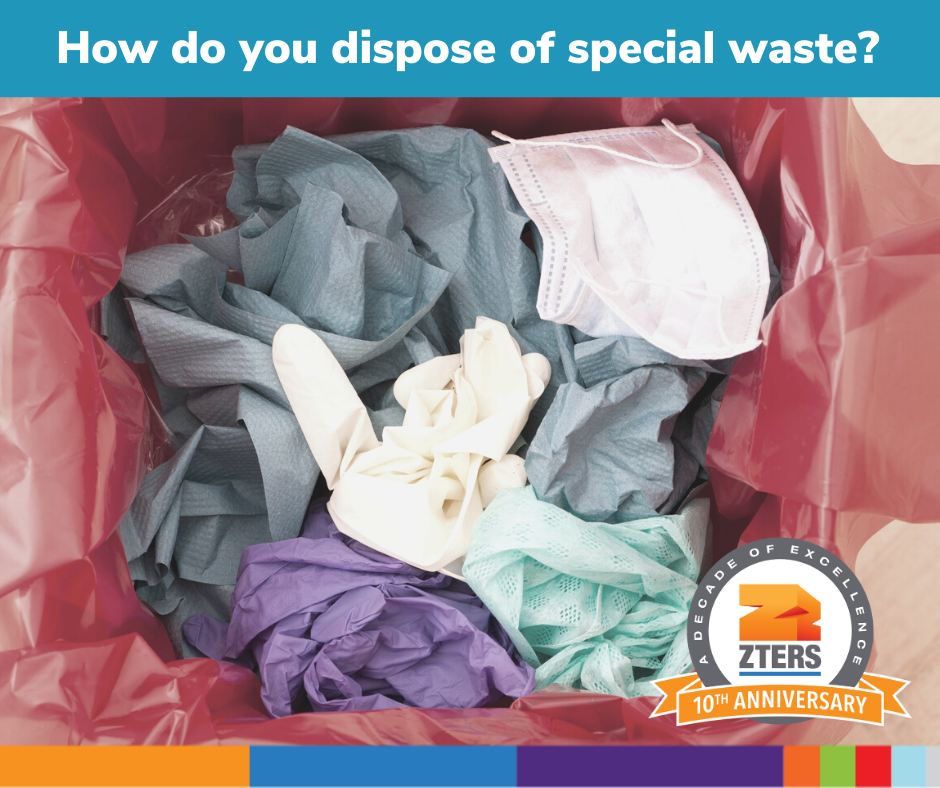Hazardous waste can take many forms, depending on the industry and the facility producing the waste. It is most often produced in medical facilities, at industrial sites, in commercial buildings, and even in residences across the United States. So, how do you dispose of hazardous waste? What do property owners and managers need to know about potentially hazardous materials?
Hazardous materials are defined as anything damaging to the environment, including soil, air, and water, or waste that puts human populations at risk. Typical examples include:
- Poisons
- Carcinogens
- Radioactive materials
- Medical waste
- Some electronic devices
- Paint, batteries, and certain types of light bulbs
Management of hazardous waste in the U.S. is regulated under the Resource Conservation and Recovery Act (RCRA). This law establishes a “cradle-to-grave” framework that controls hazardous waste from its creation to its eventual disposal. It is illegal to dispose of hazardous waste in ways that are not sanctioned by the Environmental Protection Agency (EPA).
Fortunately, businesses and homeowners have help when it comes to disposing of potentially hazardous waste. When in doubt, don’t throw any potentially hazardous materials in your regular trash or dumpsters! Instead, contact your municipal waste disposal agency or a waste specialist for guidance.
Before you call, here are some basic things you need to know about proper disposal of hazardous waste.
Contact a qualified waste agency
Disposal of hazardous waste is regulated by the EPA, but disposal practices and policies vary by state, community, and sanitation company. Homeowners or commercial property owners who want to dispose of hazardous waste need to understand what qualifies as hazardous waste, then contact their sanitation company or a waste specialist for assistance.
There are specific chain of custody and paperwork requirements for certain types of waste, so it makes sense to contact your municipality to find out if there are any local regulations to follow. You can also go directly to a waste services company. They handle potentially hazardous waste every day, so they will often already know the regulations in your area.
What can be thrown away normally
A waste services company can provide guidelines to help you understand what can be thrown away by ordinary means and what is considered hazardous. Dumpsters, for example, are only allowed to hold certain types of waste. Using the wrong type of dumpster or putting hazardous materials into a dumpster intended for regular waste can cause health hazards as well as put your business in a position of liability.
As a property owner, here’s how you can make sure you aren’t disposing of hazardous waste improperly:
- Train staff to throw away only items that are allowed to go in the dumpsters.
- Post signs around dumpsters to inform people what can and can’t go in dumpsters.
- Provide regular reminders to staff to ensure they are only throwing away allowable items.
If you aren’t sure whether your waste is considered hazardous or not, ask a waste disposal company or your local sanitation department. If it could damage the soil, air, water, or human health…then it is probably hazardous.
Schedule a pickup request
Most waste companies will pick up hazardous waste, but you will need to call and schedule a pickup request. There will likely be forms to fill out. Ask if the waste company will manage the hazardous waste paperwork or if you’ll be responsible for any filings.
The RCRA regulates the method of transportation of hazardous waste. This means many types of hazardous waste cannot be transported by the consumer that produced the waste. Scheduling a waste pickup service with a qualified waste company will help ensure the waste is properly contained, transported, and disposed.
Explore Recycling Options
Some types of hazardous waste, like batteries and paint, can be recycled instead of thrown away. Whenever possible, consider recycling. Your waste company should have a list of materials that can be recycled. Ask about recycling options when you book your dumpster.
When you dispose of hazardous waste, it pays to work with a waste service provider that will help you navigate the process. ZTERS has more than a decade of experience with all types of waste disposal nationwide. We can help you find the right dumpster for your waste, whether hazardous or not. We even have a commercial waste division that can help you plan your commercial waste disposal.
Give us a call to find out how we can make your hazardous waste disposal easier.

